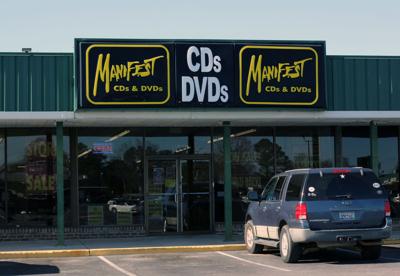When Manifest Columbia closes at the end of the month, it will be an anticlimax. Though many are rife with nostalgia for what the local music shop once was, it’s impossible to ignore its slow, decade-plus decline.
Carl Singmaster, a University of South Carolina grad and former student DJ at the school’s WUSC radio station, opened the first location of Manifest on upper Main Street in downtown Columbia in 1985. It quickly became a magnet for fans of music one couldn’t find at the mall-based chains, growing to include multiple stores across South Carolina and into North Carolina. (I worked at the Charleston location in the early ’90s). The Columbia store would eventually move into an expanded location in the current Boozer Shopping Center on Broad River Road.
“Art Boerke and I walked in to check out the store the day Carl opened,” recalls Bill Sengstacken, another former WUSC DJ now living in Atlanta. “I was blown away by the selection.”
“I ended up buying Robert Calvert’s Captain Lockheed and the Starfighters because Carl put it on the in-store music for Art, who loved Lemmy of Motörhead, and Lemmy played bass in Hawkwind with Calvert. Art passed, but I loved it.”
It was this combination of passion and knowledge that set Manifest apart from its generic competitors.
Chris Sutton, singer for the longstanding local hard rock band Isabelle’s Gift, worked at Manifest. Before that, he was a customer that was thankful for its existence.
“Music is the closest thing I have to religion and discovering a place where the staff not only welcomed me but could answer almost every fanatical inquiry I had about music was akin to mainlining a drug,” he claims. “One of the most influential moments of my teen years was Donna Maxwell, my favorite Manifest employee at the time, handing me a copy of Bleach by an unknown band from Seattle called Nirvana. I’d been asking about them only because I’d seen Chris Cornell of Soundgarden wearing their T-shirt.”
“When I was younger, I remember shopping at the downtown Manifest,” says Eric Woodard, who now owns and operates his own record store, Scratch N Spin, in West Columbia. “When I moved to Columbia for college I got my first record store job at Record Town in Columbia Mall, where I had to wear a shirt and tie, so when I got a chance to apply at Manifest I jumped at the opportunity.”
Anyone who shopped at Manifest knows the store never had a dress code. Sometimes the only way to tell the staff from the customers were the lanyards with badges that said, “Yes, I Work Here.”
Woodard’s legacy with Manifest involves used CDs.
“I started part-time to process and overhaul the overloaded used section, which fit on a large flat table,” he remembers. “Once we moved into the larger space in Boozer I made the used section a full department and we got back into the used vinyl business, too.”
Manifest was more than just a place to buy music. The larger Boozer location allowed for in-store performances from many artists, from hard rock act Jackyl to rapper LL Cool J to jam band Widespread Panic, among others. The evidence of these wide-ranging appearances could be seen for years afterwards on the signed ceiling tiles the artists left behind. The store was also supportive of local recordings, often becoming the first store to sell a band’s independent release — Hootie & the Blowfish’s Kootchypop, for instance. Manifest participated in the industry’s Soundscan system for tracking sales, so those figures were reported even for the indie stuff, an important selling point for local and regional artists looking to get noticed.
Sutton remembers the importance of Manifest and other similar stores in his band’s career.
“The local record shop was key back then to market and promote your music,” he says. “It gave local bands a home to sell their tunes and reach an audience way before our modern ease of social media and the digital world.”
While several Manifest staffers moved on to other prominent record store efforts — former Free Times editor Dan Cook and Chris Bickel, who now leads the way for the vinyl department at Five Points stalwart Papa Jazz Record Shoppe, opened the fondly remembered New Clear Days — Woodard comes closest to carrying on the Manifest tradition. His Scratch N Spin offers nearly 5,000 square feet of music, movies, comic books, toys, video games and other merchandise, utilizing a mixture of secondhand racks and display cases from Manifest, Sounds Familiar, CD Plus and other long-shuttered stores. Last fall, he bought the old stage from Manifest to add a permanent performance space.
“We want to keep that Manifest tradition alive,” Woodard offers. “We hosted BC Villanova and Prettier Than Matt on Black Friday Record Store Day, and in true Manifest tradition, had them sign ceiling tiles in the store.”
Singmaster sold the original Manifest to an outside company in 2004. The current owner is Transworld, which also runs major mall-based chains such as FYE.
Sutton says that while the store originally was an essential part of the local scene, its influence has waned tremendously since Singmaster’s departure.
“WUSC, Rockafellas, Superior Feet Playhouse, Free Times and Manifest were the elements that created a foundation for a scene here in South Carolina that I simply can’t be thankful enough to have been a part of,” he says. “Watching it deteriorate over the years has been difficult, and while I understand that the Manifest I grew up in isn’t really the same store that’s there now, it’s not going to make it hurt any less to drive by Boozer Shopping Center once that sign comes down.”
Let us know what you think: Email editor@free-times.com.







